US-Trained Economist Detained By Islamic Republic Agents
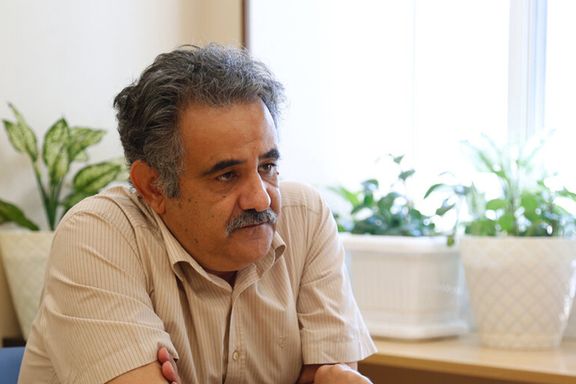
Iranian economist Davood Souri, an alumnus of the Virginia Polytechnic University and a tenured professor at Tehran’s Sharif University, has been arrested by the Islamic Republic’s agents.

Iranian economist Davood Souri, an alumnus of the Virginia Polytechnic University and a tenured professor at Tehran’s Sharif University, has been arrested by the Islamic Republic’s agents.
According to reports, security agents raided Souri’s home on Monday night and took him along with his laptop and mobile phone. He later managed to call his family and inform them he was taken to the Evin prison.
Earlier in the week, an economics PhD candidate of the same university, Mohammad Mollanouri, was also arrested.
The Islamic Republic’s security agents have been arbitrarily arresting many academics and journalists who are not even known to be political activists. Most of the detained intellectuals have done nothing but sympathize with the current wave of protests, ignited by the death in custody of 22-year-old Mahsa Amini. Some of them have been released on bail.
On Sunday, Iranian plainclothes agents abducted Dariush Farhoud, an 85-year-old professor of medical and clinical genetics known as the father of Iran’s genetics and released him after about two days of interrogation.
More than 2,300 academics from US universities urged President Joe Biden on Tuesday to do more to support the antigovernment protesters in Iran.
On Wednesday, the new UN human rights chief Volker Turk said in his first media briefing since taking office that there was a worrying pushback against progress in easing rights abuses, above all on gender issues, pointing to the Islamic Republic’s violent clampdown.
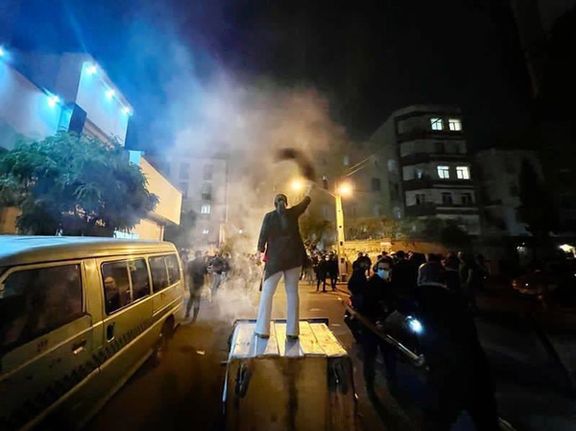
More than 2,300 academics from US universities have urged President Joe Biden to do more to support the antigovernment protesters across Iran.
In a letter sent to the president Tuesday, the academics, including more than 425 Iranian-American professors, called for “urgent attention to a dire situation in Iranian universities,” asking Biden to take “further tangible actions.”
They urged US president Joe Biden to “halt any and all negotiations with the Iranian regime, and prevent any sanctions relief under any pretext, directly or indirectly, until all violators of human rights in Iran are held accountable.”
The letter, signed by 10 Nobel laureates as well as many members of the Iranian diaspora, said that “An attack on the freedom of one university community is an attack on the freedom of all.”
Noting that demonstrations in more than 170 Iranian cities, including in over 100 universities, have been violently suppressed by the regime’s security forces since the outbreak of the uprising in Iran, they said that the repression is becoming harsher every day, and hundreds have been killed and thousands arrested so far.
“We also ask you to recognize the universally accepted right of the Iranian people to self-defense as they seek to attain sovereignty and self-determination,” they concluded.
In another similar measure, over 500 scholars launched a petition to demand the release of all activists, including students, from the prisons of the Islamic Republic, calling on the international scientific community to amplify the voices of those in Iran, scientific journal Nature reported.
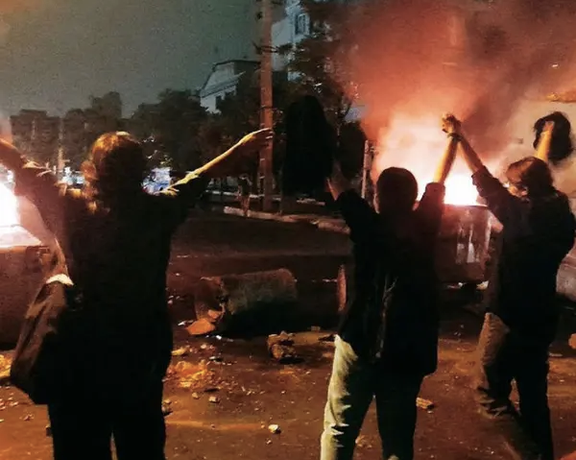
There is no let up in protests in Iran as demonstrations continue in various cities and activists call for more rallies and civil disobedience in the coming days.
In the capital Tehran, people chanted slogans behind windows and on rooftops Tuesday night, and some staged protest rallies in Tehranpars, Saadatabad, Ekbatan and Jannatabad districts.
Despite the unprecedented uprising against the Islamic Republic, Supreme Leader Ali Khamenei on Wednesday once again accused foreign nations of instigating protests across Iran saying that he has no problem with the youths who are on streets “as they are our own kids!”
“The presence of some teenagers and young people in streets is the surface of the issue. These are our own children, and we have no argument with them as they entered the field due to some excitements…, but the important ones are the main directors who entered with a plan,” added Khamenei.
Despite his claim about children, security forces so far have killed at least 40 teenagers and younger children.
Referring to the protest movement, he called it a “hybrid war” and not just “street riots” and once again blamed it on the United States, Israel, “some mean European powers,” claiming that “the nation slapped and defeated them.”
Dehloran is the latest city that joined the uprising. In Dehloran, on the border of Iran and Iraq, protesters lit fires and clashed with security forces Tuesday evening. Neighborhood-oriented protests continued in several cities, including Sanandaj, Bandar Abbas and Marivan.
People in the western flashpoint city of Sanandaj took to streets Wednesday morning chanting slogans against the clerical regime. Videos show merchants and shopkeepers across the city have gone on strike.
Meanwhile, students of Beheshti university of Tehran and Industrial University of Esfahan held gatherings chanting anti-government slogans.
Students of Hormozgan Medical Sciences University, Tehran Azad University, and Rasht Azad University have announced in a statement that they boycotted the courses and asked other students and professors to stand by them.
Dentistry students at Shiraz University staged a sit-in and in Shahr-e Rey Azad University near Tehran students defied the gender segregation at the cafeteria.
Schoolboys and girls in a number of cities, including Tehran, Karaj and Marivan, chanted slogans against Supreme Leader Ali Khamenei.
In Karaj near capital Tehran, people hung placards to call for a march to the city cemetery on Thursday.
According to the latest information by Iran Human Rights, at least 277 people have been killed by security forces in the nationwide protests so far. Of those, 40 were under 18 years of age but have not all been verified through document evidence.
“Protesters have been killed in 22 provinces, with the most reported in Sistan and Baluchistan, Mazandaran, Tehran, Kurdistan and Gilan respectively. The greatest number of deaths were recorded on 21, 22 and 30 September. October 27 was the bloodiest day last week with 12 recorded deaths,” says the organization.
The Norway-based human rights organization also expressed concern regarding the fate of the detained protesters saying, “dozens of them have been charged with the security-related charges of ‘moharebeh’ (enmity against God) and ‘corruption on earth’ which carry the death penalty.
The Islamic Republic’s history and current evidence indicate that they intend to use the death penalty as a tool of political repression to intimidate their opposition.
However, the Judiciary deputy Mohammad Mossadeq claimed on Wednesday he does not know how many people have been arrested in recent protests. “I don't know, but more than 90 percent of the detained were released after 24 hours,” he said.
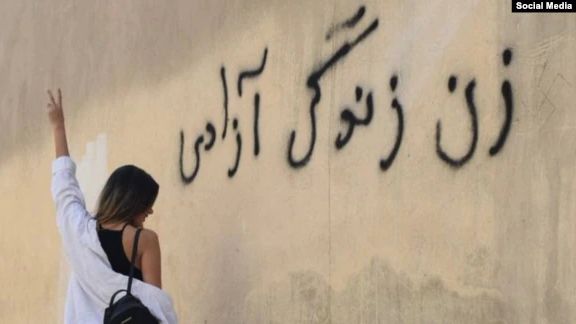
An Iranian lawmaker from western Iran says at least six protesters have been killed in the northwestern city of Mahabad during the past three days.
In an interview with Rudaw news channel, Jalal Mahmoudzadeh, the representative of Mahabad in the parliament, said these civilians were killed by the direct fire of the security forces.
Mahmoudzadeh further added that he is going to question the interior minister about the results of his investigation into these deaths.
This MP’s remarks come as the Norway-based Iran Human Rights Organization says at least 18 people have been killed in West Azerbaijan province since the beginning of the nationwide protests.
Mahabad in West Azarbaijan province, with a large Kurdish population, has been the hotbed of fierce clashes between anti-government protesters and security forces within the past few days.
Last Thursday, large crowds took to the streets in this city taking control of the governorate and some other buildings. It was after the funeral ceremony of 35-year-old Esmail Moloudi who had been killed during protests the night before.
Meanwhile, the protests against clerical rule continued on Tuesday despite the threats by the authorities. University students across the country staged strikes, sit-ins, and demos to vent anger at government’s inhumane policies.
In Tehran, universities of Beheshti, Sharif, Al-Zahra, Amirkabir, Kharazmi, Allameh, Azad North, and Azad East were the scene of anti-government protests mostly calling for the release of the detained students.
In Amol, Esfahan, Yazd, Mashhad and other cities the students also held sit-ins and chanted slogans against the Islamic Republic.
The students at the Mashhad University of Journalism announced that they will not attend classes until further notice due to the arrest, threat and suspension of students across the country.
Videos received by Iran International show students at Tehran’s Beheshti University chanting, “The university has become a prison, at Sharif, Beheshti, and Tehran...”
Reports say within the past few days, the security office at Malayer University in Hamedan province has threatened to suspend and expel nearly 200 students.
In addition to universities, school students also held protests and chanted slogans on Tuesday.
Social media videos show the female students in Karaj and Shahryar near Tehran poured into streets chanting “All these years of crime, death to this leader [Khamenei].”
Another video shows schoolgirls in Sanandaj march shouting “Women, Life, Freedom.”
Reports coming from Sistan and Baluchestan province in the southeast say on Tuesday hundreds of citizens prevented the extraction of gold from the Taftan mine.
Taftan is one of the largest gold mines in Iran, but the people declared “this mine belongs to the Baluch nation, and they will never allow the wealth of Baluchistan to be extracted and spent by outsiders.”
The total amount of gold that can be extracted from the mines in the province is estimated to be 38 tons, but only 12 to 13 percent of the native people have been able to work in these mines. Some clan chiefs said Tuesday that “We will be buried here, but we won’t let you loot the mines.”
At the same time, Molavi Abolhamid, the Sunni Imam of Zahedan, addressed the government in a tweet saying “For 43 years, with the support of the good people of Iran, the government has worked; now when the people are weary of the actions of officials, should we resort to repression, force and violence? Have you thought that you will have to live with these people in the future?”
In the meantime, the Youths of Tehran and Tabriz Neighborhoods called on people to hold anti-government demonstrations on Wednesday November 2 in all cities.
“The child-killing and brutal regime should not assume they can continue the crime and killing forever! Let Khamenei and his followers know they must pay for all the blood they have shed,” their statement released on social media said.
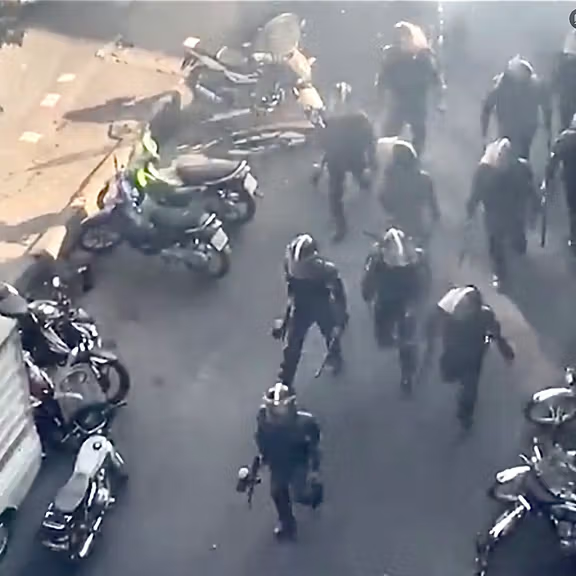
Iran International has received reports that Iraqi Hashd al-Shaabi and Kata’ib Hezbollah forces have arrived in Iran probably to help suppress protesters.
Hashd al-Shaabi and Kata’ib Hezbollah are radical Iraqi Shiite paramilitary groups which are part of the Popular Mobilization Forces backed by Iran.
According to eyewitness information received by Iran International, 150 people aged between 25 and 30, wearing special uniforms and carrying black bags, flew to Mashhad airport in northeastern Iran from Baghdad airport on Monday.
It is said that a charter flight transferred the special forces from the VIP section of Baghdad airport.
Some say the people were led by two Iranians and no one was allowed to approach their gate (Gate 43).
In the past years, there have been similar reports about deployment of repressive forces to Iran from countries where Iranian proxy militia groups operate, including Lebanon.
Recently, an unverified – and seemingly fake -- document, showing an official Hezbollah letter, was leaked on social media, claiming that Iran-backed Lebanese militant group was sending forces to help the Islamic Republic crackdown on protesters.
The document, allegedly leaked from the office of Hezbollah’s chief Hassan Nasrallah two weeks ago – dated October 14 -- said that personnel from unit 133 and unit 910 (special foreign operations) are being prepared to be deployed to defend the Islamic regime. The total number of these forces is 9,500 people.
According to a report by the Jerusalem Post in October, plainclothesmen with Lebanese-accented Arabic were seen trying to help Iranian security to suppress protesters in various cities, including in the capital of Tehran, creating speculation that Hezbollah and Iraq’s Shiite militias have been helping the Islamic Republic in its clampdown.
The clerical regime has tried not to give any hint of foreign forces being used against Iranian protesters, possibly even killing them, knowing that such information will anger the population.
The reason behind this move by the Islamic Republic could be its concern that the Iranian police might not follow orders to attack unarmed, ordinary people, or simply because its forces are insufficient to stop protests in more than 100 cities.
Fars News Agency, which is close to the Revolutionary Guard, earlier refuted the claims saying “The claim about the presence of Iran’s regional allies such as Hashd al-Shaabi and Lebanon’s Hezbollah in the internal events of our country has been said before. This proposition is repeated every time when some people say they heard security forces speaking with an Arabic accent in the [protest] rallies!”
The IRGC’s Quds (Qods) Force, which is responsible for extraterritorial operations, has for many years recruited and backed proxies across the Middle East focusing on special operations, sabotage, and finance. The Quds force is run directly by Supreme Leader Ali Khamenei, having relations with armed groups in Afghanistan, Iraq, Lebanon, Syria, Yemen, and the Palestinian territories.

The Islamic Republic has urged countries not to attend a US-organized meeting at the United Nations over its human rights violations and violent crackdown on protesters.
In a letter released on Monday, Tehran accused Washington of “politicizing” human rights issues, as Tehran has been cracking down on antigovernment protests, ignited by the death in custody of a 22-year-old woman.
Calling on UN member states to skip an informal meeting the US plans to hold among Security Council members, the Islamic Republic’s Ambassador and Permanent Representative to the United Nations Amir Saeed Iravani said, “The US has no true and genuine concern about the human rights situation in Iran or elsewhere.”
He called the ongoing protests an internal issue, warning that it would be “counterproductive to the promotion of human rights” if the UN Security Council discussed it. “The United States lacks the political, moral, and legal qualifications to hold such a meeting, distorting the very basic principles of human rights,” Iravani added.
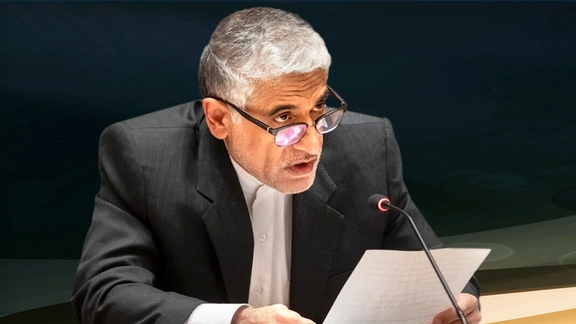
The United States and Albania plan to hold an informal Security Council meeting on Iran on Wednesday, aimed at highlighting “the ongoing repression of women and girls and members of religious and ethnic minority groups,” and would “identify opportunities to promote credible, independent investigations into the Iranian government's human rights violations and abuses.”
The informal UN Security Council gathering was called by the US and Albania, which currently sits on the council. Iranian Nobel Peace Prize laureate Shirin Ebadi, actress Nazanin Boniadi, and Javaid Rehman, the UN Special Rapporteur on human rights in Iran, are due to address the gathering, which will be open to state representatives and human rights organizations.

The format of the meeting is called the “Arria formula”, after its originator, Diego Arria, a Venezuelan ambassador who in 1992 initiated the first informal meeting of the Council to discuss the crisis in former Yugoslavia. The meetings take place in a non-rigid setup where member states can hear comments by individuals and non-state actors.
Iran’s foreign ministry spokesman Monday dismissed the significance of the meeting and claimed that the aim of the meeting is to put “political pressure on the Islamic Republic,” and is the continuation of a clear policy of interference by the American government in Iran’s internal developments.”
Expulsion of Iran from UN Women Commission
Following weeks-long efforts by several countries as well as numerous calls by activists for the immediate expulsion of the Islamic Republic from the UN Commission on the Status of Women (CSW), the Canadian Parliament unanimously adopted a motion on Monday that calls for Iran’s removal.
Introduced by Conservative Party Deputy Leader Melissa Lantsman, the motion was adopted following a similar call made by New Zealand’s prime minister, and Canada’s deputy prime minister and foreign minister.
“Given the brutal death of Masha Amini at the hands of Islamic Revolutionary Guard Corps (IRGC), the subsequent crackdown in Iran on women’s rights, civil liberties, and fundamental freedom, and the long history of grave human rights abuses and violence against women perpetuated by the Iranian state, that this House declares its support for the removal of Iran from the UN Commission on the Status of Women,” read the motion.
A second motion put forward by Bloc Quebecois member of parliament Andreanne Larouche called on fellow MPs to declare support for Iranians protesting for their rights, and that the House of Commons “condemns the intimidation and bullying and violence against the protesters, who are supporting the movement to free women in Iran.”
In an open letter published in The New York Times on Sunday, Deputy Prime Minister Chrystia Freeland and Foreign Affairs Minister Melanie Joly joined other female world leaders in business, politics, and the arts from over 14 countries urging the UN to oust the Islamic Republic from the CSW.
The UN commission on the status of women is a global intergovernmental body “exclusively dedicated to the promotion of gender equality and the empowerment of women” through “promoting women’s rights, documenting the reality of women’s lives around the world, and shaping global standards on gender equality and the empowerment of women,” its website says.